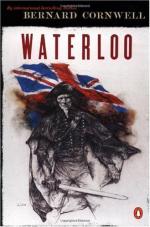
|
| Name: _________________________ | Period: ___________________ |
This test consists of 5 short answer questions, 10 short essay questions, and 1 (of 3) essay topics.
Short Answer Questions
1. What is the use for the cobbled road?
2. How does Rossendale get separated from his friends?
3. What is the weather like as the British wait for Napoleon's army?
4. Where do Sharpe and Harper watch the attack by the French skirmishers?
5. What happens to the farmland around Quatre Bras?
Short Essay Questions
1. How does the author fit in a depiction of the Allied Forces in Chapter 13?
2. What new weapon is used, who invented it and why did the description of it stand out among other action scenes?
3. What is one of the most striking differences at the end of a battle and the disposition of the dead between that era and now?
4. What is it about the British muskets that proves the beginning of the French's downfall?
5. What is a major failure on the French part that leads to their ultimate defeat?
6. What explanations about British firing techniques are described in great detail in chapter 15?
7. What type of relationship does the contrast of the two opposing generals have to the two armies?
8. Why, on the third day, are the French still confident of victory?
9. What happens to the British Heavy Cavalry unit with which John Rossendale is riding?
10. What stops the French from pursuing the retreating British army?
Essay Topics
Write an essay for ONE of the following topics:
Essay Topic 1
D'Alembord's premonition that he will be killed and his developing fear of tomorrow's events exemplifies the true nature of courage, which includes coming to terms with fear and overcoming it.
1. Discuss in detail whether courage is the absence of fear or doing a task in spite of it. Use examples to support your answer.
2. If a person runs from a battle due to fear, do you think that means he will always run from a battle? Why or why not? Use examples to support your answer.
3. If a person goes into combat with no fear and kills a significant number of the enemy and perhaps rescues other soldiers, is that person courageous? In other words, if a person acts like a hero/ine, yet truly has no fear, does that person still qualify as having courage? Why or why not?
Essay Topic 2
Before the battle, civilians gathered to watch the fighting. Given war today, this seems a strange custom and dangerous. Nothing is written as to how the civilians of the losing army would be treated.
1. How often do you think "innocent" civilians are killed during a war or conflict?
2. Is it immoral to harm non-combatants during a conflict? What if those non-combatants support their government's policies about the war/conflict?
3. In WWII, the US government targeted two cities in Japan with atomic bombs. The targets were not military targets and the intent was to kill as many people as possible, no matter their age, sex, or status. Is this an acceptable way to end a war?
Essay Topic 3
Most protagonists are a mixture of admirable traits and character flaws, and Richard Sharpe is no exception. Sharpe's legendary powers of military strategy are juxtaposed with his reputation as a womanizer and his hatred for his wife. Discuss the following:
1. Trace and analyze situations when Sharpe demonstrates his prodigious powers of military strategy. Give specific examples to illustrate your analysis.
2. Trace and analyze Sharpe's character flaws offering specific examples of these flaws in your discussion.
3. Discuss how you think Sharpe's admirable traits helped him obtain a high rank in the military despite his background as a child. Have his flaws impacted his career at all? Do any of those under his command seem to notice these flaws? Who? How does the reader know this?
|
This section contains 1,057 words (approx. 4 pages at 300 words per page) |

|




